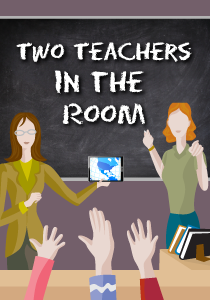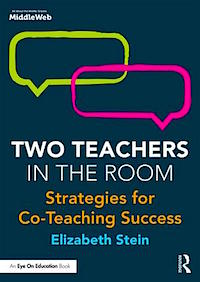Finding Co-teacher Unity with a “PCK” Strategy
A MiddleWeb Blog

Perhaps it’s a little bit of both. Within these past few months, my collaborations with teachers near and far reveal one very frequent theme that may be addressed within one powerful solution. Are you ready for it? Let’s see how you connect…
First—here’s the problem: Special education teachers have something in common – a dazed reality as they are inundated with busy schedules that include learning multiple subject areas, various grade levels, and a wide range of curricula—all within their daily routine.
General education teachers respond to this reality by either supporting their colleague or just teaching full steam ahead – leaving the special education teacher in the shadows. Either way we have two frustrated teachers in the room.
So are you ready for one potentially powerful solution?
Try Pedagogical Content Knowledge (PCK)
PCK (Schulman, 1987) offers co-teachers a way to see co-teaching through various lenses. It is about making any subject matter accessible and understood through a layered knowledge approach. This approach provides seven ways to consider the various levels of knowledge that a pair of teachers may bring to the classroom in order to experience their instructional time with parity, respect, and ongoing collaboration.
. . .(PCK includes) the most regularly taught topics in one’s subject area, the most useful forms of representation of those ideas, the most powerful analogies, illustrations, examples, explanations, and demonstrations – in a word, the ways of representing the subject that make it comprehensible to others. . . .(I)t also includes an understanding of what makes the learning of specific topics easy or difficult: the conceptions and preconceptions that students of different ages and backgrounds bring with them to learning.” (Shulman, 1987 p. 9) – Source
First, let’s get a broad view of PCK. And while you are reading, I hope you think of the ways each layer of knowledge applies to you…and you consider the individual, unique knowledge that YOU bring to your co-teaching partnership.
1. General pedagogical knowledge: Teachers possess an understanding of the broad principles and strategies for effectively managing their classroom.
2. Knowledge of learners: Teachers know their students’ abilities, interests, and areas that are in need of strengthening.
3. Knowledge of educational contexts: Teachers know which structures will be the best match for the context of each specific lesson. For example, teachers know how to apply flexible grouping and a variety of co-teaching models to bridge learning across time.
4. Knowledge of outcomes, purpose, and values: Teachers have a clear sense of vision for learning outcomes – as well as what it means to be a self-motivated learner.
5. Content Knowledge: Teachers know the subject matter they teach.
6. Curriculum Knowledge: Teachers know the materials, subject matter, and strategies that apply to specific lessons.
7. Pedagogical Content Knowledge: Teachers know a variety of ways to represent information as they guide learners to connect and construct meaning. This “PCK layer” also connects teachers with the knowledge of their personal qualities that each teacher brings to the learning process to guide their students.
PCK and YOU
As you move along with your co-teaching routines and schedules, seize each moment. The many minutes embedded in the months ahead can be magnified by your seven layers of knowledge – and doubled because you have two teachers in the room! The PCK approach offers a wider lens for considering the multiple ways co-teachers may unite as one co-teaching pair, tapping into each other’s strengths.
So here it is…seven layers…seven ways co-teachers can be knowledgeable. Which PCK knowledge layer do you connect with the most? How about the least? And here is the question for you and your co-teacher to really connect…Which layer(s) would you like to strengthen in yourself personally? Which PCK layers can you support your co-teacher in strengthening?
Here’s the point where you consider all that I am saying here…and share your questions, comments, and connections right in the comment section. You can also share with me on Twitter @ElizabethLStein. Add the #CoTeachat hashtag to widen this conversation. Let’s do this!
______________________________________


































